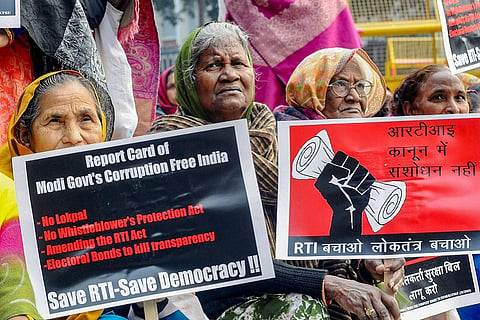

The Right to Information (Amendment) Bill, 2019, was passed on Monday evening by the Lok Sabha, even as several opposition parties insisted that the amendments to the law were "dangerous" for the fundamental rights of the citizens and a "threat to the Constitution and parliament." Some members of Opposition also staged a walkout. The Bill has also seen considerable opposition from RTI activists, and a protest march was also held on Monday to refer the Bill to a Standing Committee.
The Bill was introduced in the Lok Sabha by the Minister of State for Personnel, Public Grievances and Pensions, Jitendra Singh on July 19.
Here are the amendments that the opposition, as well as RTI activists, are against:
According to the RTI Act of 2005, the State and Central Information Commissioners currently hold the position for five years. The amendments want the term to be prescribed by the Centre. The bill introduced proposes to give the Centre the power to set the tenure and salaries of State and Central Information Commissioners.
According to the original Act, the Chief Information Commissioner (CIC) was paid as much as the Chief Election Commissioner and the Information Commissioners (IC) were paid as much as Election Commissioners. The bill seeks to change this, where the salaries of the CIC and IC would be prescribed by the Centre.
The Act stated that if a CIC or IC receives a pension at the time they are appointed — barring a disability or a wound pension — that amount would be deducted from their salaries. It also said that if they receive retirement benefits from a “Corporation established by or under any Central Act or State Act or a Government company owned or controlled by the Central Government or the State Government,” the salary would be reduced by that much. The current amendment seeks to do away with this.
CICs and ICs are appointed were treated on par with the Chief Election Commissioner and Election Commissioners, and State Information Commissioners with the Chief Secretary. The Appointment Committee for the CIC and ICs includes Prime Minister (Chair), Leader of the Opposition in the Lok Sabha and one Union Cabinet Minister to be nominated by the Prime Minister.
At the time Jitendra Singh introduced the Bill, he spoke about his government’s "commitment to transparency" and how it worked on the principle of minimum government and maximum governance. He insisted that the Bill would institutionalise, streamline and ensure the ease of delivery of the RTI Act.
Criticism from RTI activists
The introduction of the bill did not go down well with RTI activists and former members of the Information Commission, who have actively said that this undermines the Act.
The National Campaign for Peoples’ Right to Information slammed the move and said that this would weaken the institution.
“Enabling the Executive to govern the functioning of the Commissions will fundamentally weaken the Institution of the Information Commissions as it will adversely impact their ability to function in an independent manner. The information Commissions are the final authorities to adjudicate on claims of access to information which is a deemed fundamental right under the Constitution,” a statement said.
“Now itself, the Governments are choosing the retiring Babus, who are very loyal to them as ICs so that they do not independently act according to RTI Act. With this Bill, the persons selected as ICs with reduced stature, term and salary will be further submissive to Chief Ministers and Prime Ministers and deprive the citizen of their right to information. This will kill the Right to Information totally,” former Chief Information Commissioner Sridhar Acharyulu wrote.
Speaking to TNM, Sridhar said that this will render the RTI Act useless, and there won’t be any autonomy, but subordinate to an executive branch.
“If the commissioner is not of a specific stature and if he doesn’t have the designation, how can he direct officials? And if he can’t direct these officers, where will the Commissioner get the information from? The IC directs the public authority, not the public information officer. Now, it is not possible to direct because he’ll either be a joint secretary or a deputy secretary — we don’t know. It depends on the whims and fancies of the government of the day,” he said.
With regard to the tenure being set by the government, Sridhar said that the importance of independence lies in the difficulty in removing the Commissioner. “Independence lies in certain tenure, and you are not fixing the term. You are trying to reduce it and make it totally uncertain,” he added.
Lok Satta party founder Jayaprakash Narayan tweeted, "RTI Act amendments:the reason given is unconvincing. GoI has a lot on its plate:economy is facing headwinds;rule of law is in shambles; infrastructure is creaky;education and healthcare need serious reform. Yet a lot of political capital is expended just to show who is the boss!"
RTI activist Anjali Bharadwaj called it "a serious blow". "RTI Amendment Bill passed by Lok Sabha. Many factually incorrect statements made by minster. Amendments are to undermine independent institution of information commissions. Must be referred to Rajya Sabha select committee," she said.